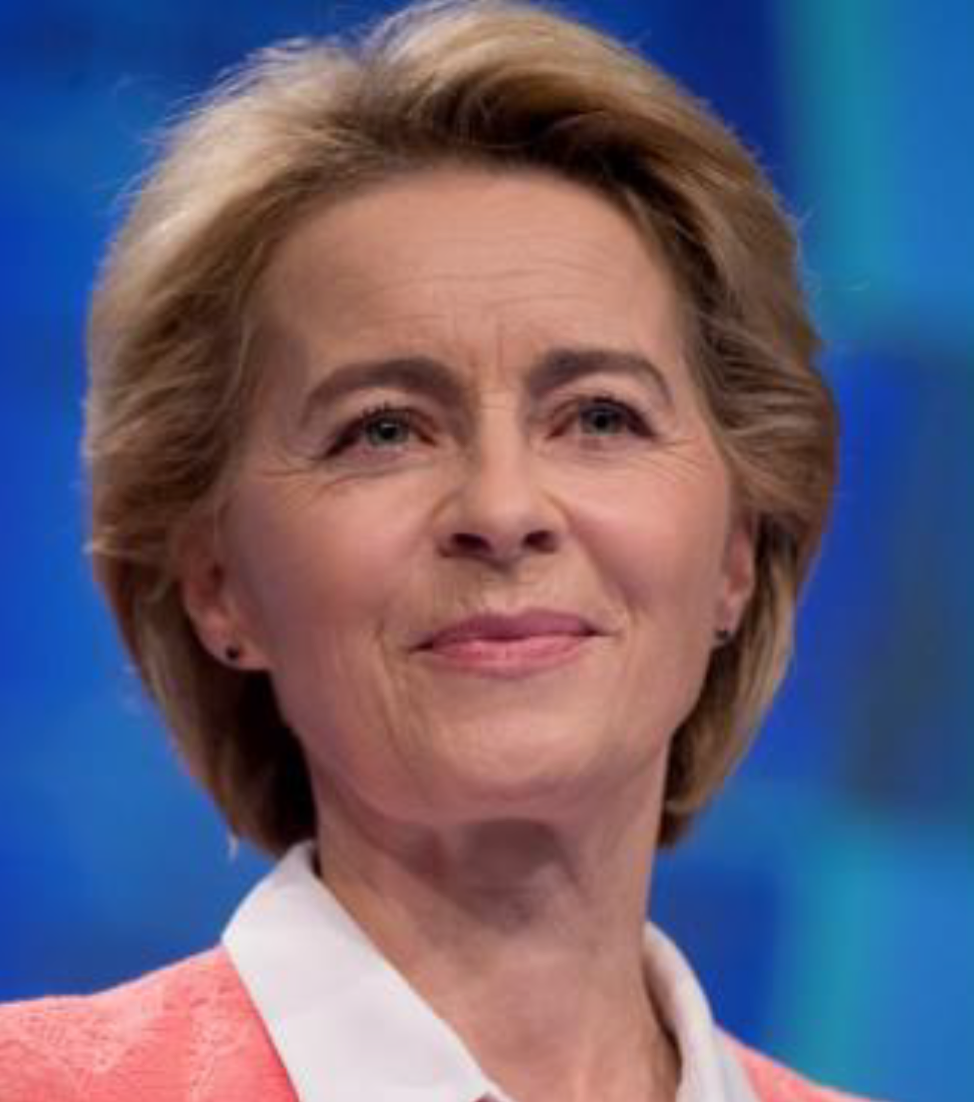
by Editor | Dec 30, 2020 | News
NOMINATION
History of AI 2020
President Ursula von der Leyen
Trained as a physician, Ursula von der Leyen entered politics as a cabinet minister in the German state of Lower Saxony. When Angela Merkel became German chancellor in 2005, she appointed Dr. von der Leyen as Minister of Family Affairs and Youth, a portfolio that aligned with her work on women’s health.
After four years in that position, she was appointed Minister of Labor and Social Affairs. She was then appointed Minister of Defense, the first woman to hold that top post. Von der Leyen also had the distinction of being the longest serving minister of the Merkel government.
As incoming President of the European Commission, in December 2019 von der Leyen called for new rules for AI that respect human rights and public safety. At the 2019 G-20 Summit in Japan, Chancellor Angela Merkel earlier proposed “It will be the job of the next Commission to deliver something so that we have regulation similar to the General Data Protection Regulation that makes it clear that artificial intelligence serves humanity.”
In February 2020, President von der Leyen set out a White Paper on AI for public consultation. In the September 2020 State of the Union Address, she prioritized AI policy for the European Union. She said, “Whether it’s precision farming in agriculture, more accurate medical diagnosis or safe autonomous driving – artificial intelligence will open up new worlds for us.” Von der Leyen continued, “But this world also needs rules. We want a set of rules that puts people at the centre. Algorithms must not be a black box and there must be clear rules if something goes wrong. The Commission will propose a law to this effect next year. This includes control over our personal data which still have far too rarely today.”
And speaking to the Boston Global Forum on December 12, 2020, President von der Leyen called for a Transatlantic Agreement on AI, based on democratic values, including “human rights, pluralism, inclusion, and the protection of privacy.” For her pioneering leadership, she received the 2020 World Leader for Peace and Security Award.
President von der Leyen is also a tireless advocate for a more united Europe, a Europe that would assume a larger role in international diplomacy and security. A champion of democratic rights and institutions, she has contested the emergence of right-wing nationalism and state authoritarianism. She has pressed European countries to act collectively against COVID-19. She is committed to the Transatlantic Alliance, recognizing the collective responsibility of the EU and the US to advance global peace, security, and development.
A champion of democratic values, a trained scientist who places humanity at the center of AI innovation, President von der Leyen should be recognized for HAI 2020
Marc Rotenberg
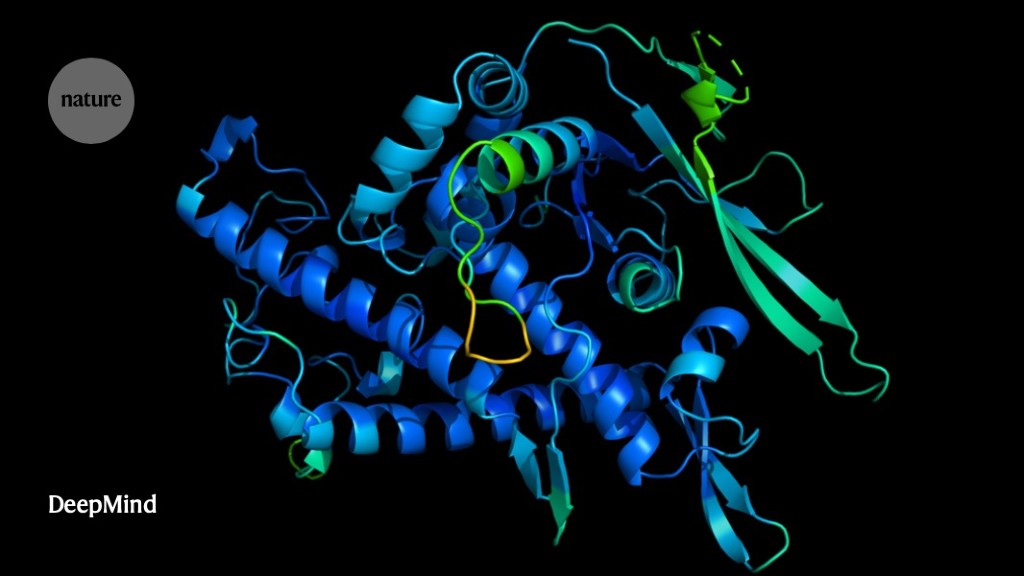
by Editor | Dec 30, 2020 | News
Towards the end of 2020, Google DeepMind announced that they developed an AI network (AlphaFold) that determines a protein’s 3D shape from its amino-acid sequence.
The ability to accurately predict protein structures from their amino-acid sequence would vastly accelerate efforts to understand the building blocks of cells and enable quicker and more advanced drug discovery. AlphaFold has been recognised as a solution to this grand challenge by the organisers of the biennial Critical Assessment of protein Structure Prediction (CASP).
CASP was founded in 1994 by Professor John Moult and Professor Krzysztof Fidelis as a biennial blind assessment to catalyse research, monitor progress, and establish the state of the art in protein structure prediction. It is considered the gold standard for assessing predictive techniques. After DeepMind’s revelation of its model and accuracy rate this year, Moult stated “In some sense the problem is solved.”
Professor Venki Ramakrishnan, the winner of the 2009 Nobel Prize for Chemistry said “this computational work represents a stunning advance on the protein-folding problem, a 50-year-old grand challenge in biology. It has occurred decades before many people in the field would have predicted.”
Merve Hickok
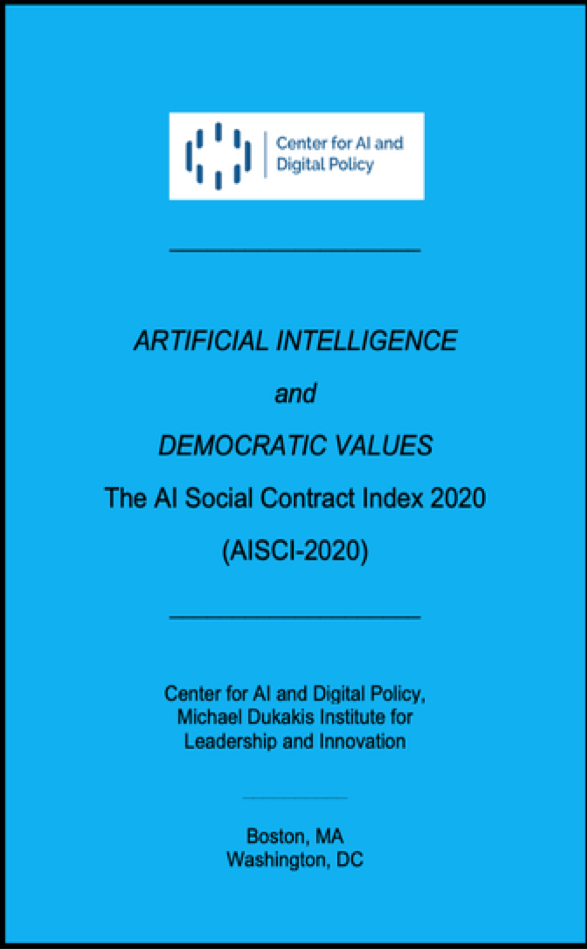
by Editor | Dec 30, 2020 | News
NOMINATION
History of AI 2020
In the last days of 2020 Artificial Intelligence and Democratic Values: AISCI-2020 report was published. The report was prepared by the Center for AI and Digital Policy at the Michael Dukakis Institute and conducted by a team of international experts.
The report is first of its kind as a comparative review of national AI policies. 30 countries were reviewed in terms of their endorsement and implementation of OECD AI Principles within their national AI strategies and public implementations. It will serve as the baseline for future work and as one scholar (Mireille Hildebrandt) called it is “a trove of materials to enable mutual learning strategies instead of reinventing the wheel.”
The report also amplifies the AI Social Contract Index and CAIDP’s mission –“to promote a better society, more fair, more just —a world where technology promotes broad social inclusion based on fundamental rights, democratic institutions, and the rule of law.” It will pushes the boundaries and expectations from governments, and seeks seeks to build a multi-stakeholder, inclusive society in all aspects of life across politics, government, economics, business, and industry.
The methodology developed for the report draws on the work of international human rights organizations and data protection experts, and provides a clear ranking for each country. The AI Index 2020 encourages all countries to make real the promise of AI that is trustworthy, human-centric, and provides broad social benefit to all.
Merve Hickok

by Editor | Dec 30, 2020 | News
30.12.2020. Zlatko Lagumdzija
The History of AI event of 2020 – The Social Contract for the AI Age
Zlatko Lagumdzija
Former Prime Minister of Bosnia and Herzegovina
Member of World Leadership Alliance-Club de Madrid
Member of the History of AI Board
Social Contract for the AI Age can be named as the History of AI event of 2020 since it is offering transformative tools and means for creating complex elements and goals of great mosaic reflecting different perspectives in search for our prosperous and shared future.
Development of AI that is impacting our life and work with magnitudes bigger than any human invention in history is a clear sign of necessity and importance of a pioneering act such as the first Social Contract in the Internet and AI Age.
Fruits of Renaissance and Age of Enlightenment have been enjoyed by people because of great thinkers like Thomas Hobbes and Jean Jacques Rousseau who created the Social Contract concept as the leading doctrine of political legitimacy and platform for peace, security and democracy centuries ago.
Social Contract for the AI Age, as agreement among all stakeholders of society to work together for social benefit, is a comprehensive and impactful call to leaders to show wisdom and leadership using science and technology fruits in order to move our planet in the right direction.
Since September creation and adoption by 10 signatories coming from different backgrounds and experiences, under umbrella of the Boston Global Forum and AI World Society (AIWS), it has been endorsed, supported and called for implementation by the World Leadership Alliance – Club de Madrid and a long line of stakeholders from governments, academic, civil society and business leaders from various parts of the globe.
Social Contract for the AI Age is a pioneering, meaningful and impactful document since it is defining the purpose, vision and values that can be met by tools and means like AI is offering.
That is why Social Contract for the AI Age can help us to shape societies for a common purpose through transformative vision that transcends the technological features of AI and seeks to provide foundations for a progressive, new, better, and more prosperous society.
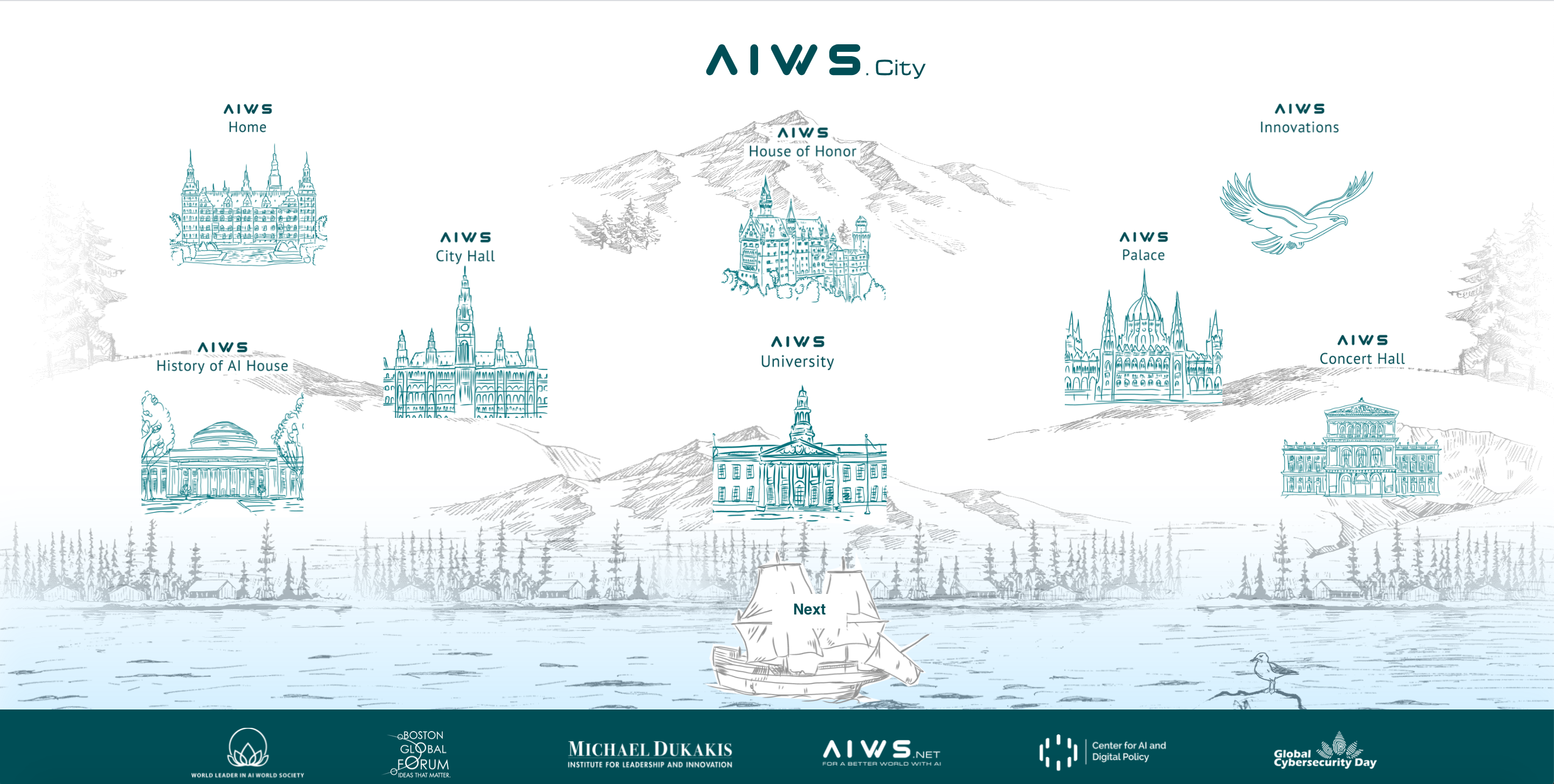
by Editor | Dec 28, 2020 | News
On December 24, 2020, Michael Dukakis Institute finished the frontpage of AIWS City.
It includes first parts of the AIWS City – as concepts: collect and engage the most noble and valuable of human being, styles of icons:
The AIWS Palace is inspired by the Hungarian Parliament in Budapest.
The AIWS University is inspired by Harvard Business School.
The AIWS City Hall is inspired by Vienna City Hall.
The AIWS House of Honor is inspired Neuschwanstein Castle.
The AIWS Home is inspired by Frederik Palace in Denmark.
The History of AI House is inspired by MIT.
The AIWS Concert Hall is inspired Musikverein in Vienna.
The AIWS Innovation is an eagle.
From the frontpage, visitor can click to Next at ship akin to the Mayflower to see the second part of AIWS City.
The homepage of AIWS City will be officially opened at AIWS.city on January 9, 2021.

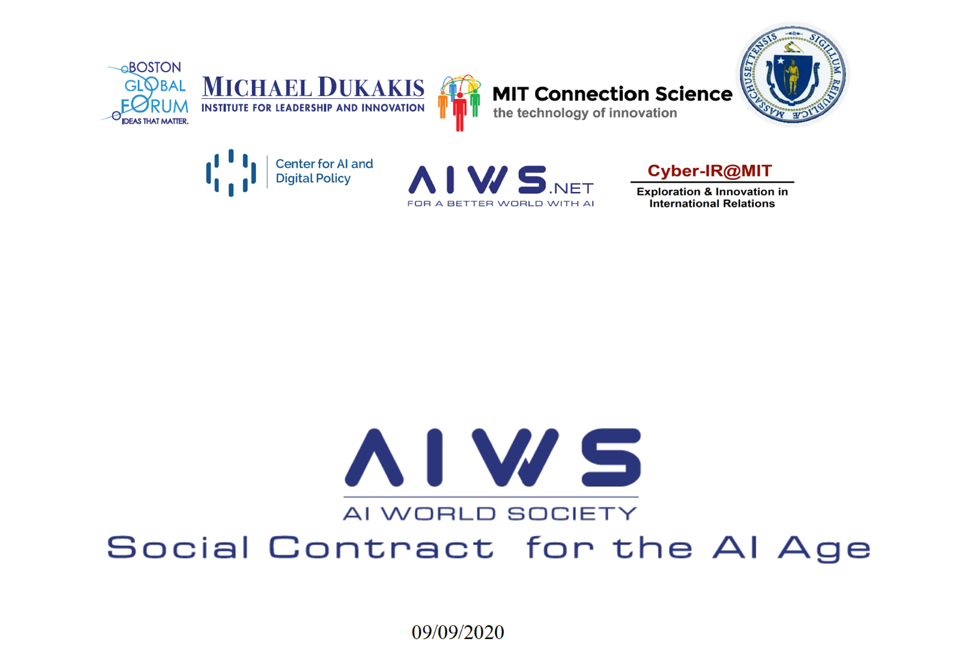
by Editor | Dec 28, 2020 | News
On December 31, 2020, the History of AI Board will announce achievements, figures, and events of AI 2020.
2020 was a special and eventful year, and yet it is ending, as we approach 2021. To cap off this memorable year, the History of AI Initiative at AIWS.net will selection and choose achievements, figures, and events in AI (including science technology, innovation, politics, policy, economy, cultures, society) in 2020:
- What are some historical achievements in AI in 2020?
- Who are notable and monumental figures in AI development in 2020?
- What are some pivotal events in AI history in 2020?
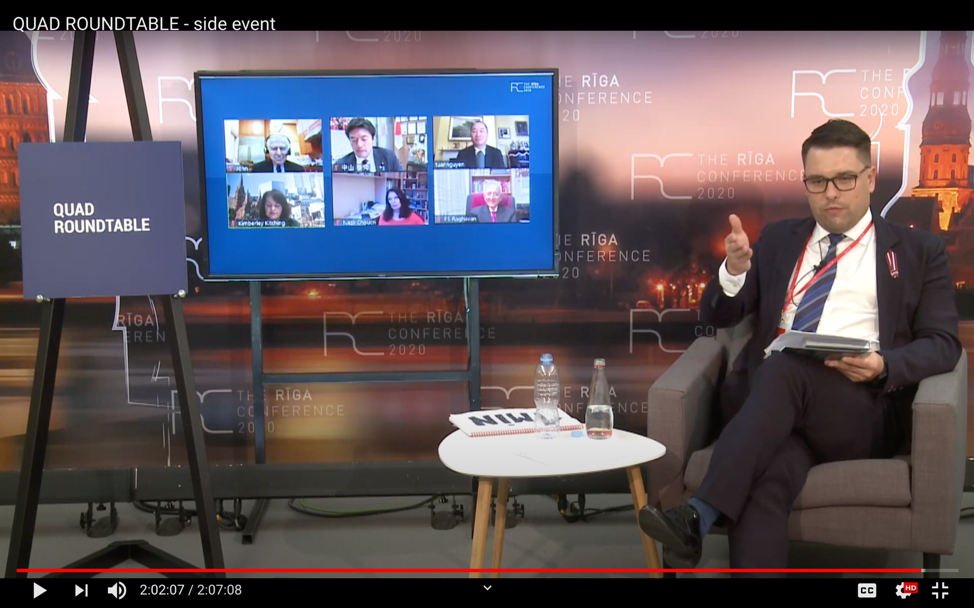
by Editor | Dec 28, 2020 | Event Updates
On December 28, 2020, the Boston Global Forum will officially publish the Report “The Quad Roundtable at the Riga Conference 2020 – The Quad Group, AIWS Social Contract and solutions for world peace and security.” The report includes the following key messages:
First, it is necessary to mend differences amongst the Western allies — such as different views of interests, diversity in social perceptions, and the role of the Western alliance in U.S. priorities –, and to reestablish US international leadership
Second, the common interest of the Quad is an open Indo-Pacific region – one that is inclusive, not exclusive. Inclusion will contribute to transparency, cooperation, and information sharing among like-minded responsible international actors. Such a situation would also facilitate containment of the pandemic from other parts of the world and from the region itself. It will also support the management of climate, humanitarian, social and security challenges for all.
In recent years, the credibility of security alliances in the Indo-Pacific region has been called into question. For this reason, the Quad emphasizes diplomacy to enhance even broader cooperation with such partners as South Korea, Philippines, Thailand, Myanmar, Cambodia, Bangladesh, Indonesia, Malaysia, Vietnam, Laos, and Europe. Indo-Pacific region must be governed by rules, and by respecting democratic values.
Third, artificial intelligence is not just a novel technology but also something that can enhance the digital economy and commercial opportunities for all.
The Quad group could also work to bring all countries in the region to a shared view of the common good.
Fourth, while addressing possibilities and challenges brought about by artificial intelligence, US leadership must consider the interconnectivity of different types of interests in the Indo-Pacific region.
However, the Quad has the important responsibility of requesting China to respect its neighbors and to refrain from generating tensions in the Indo-Pacific region. As a matter of principle, respect for Hong Kong and its democracy is imperative.
Fifth, the surge of 5G technologies will enhance the expansion of artificial intelligence. With such technological expansion, democratic values should dominate in the use of data.
The co-authors of the Report are: Professor Nazli Choucri, MIT, Boston Global Forum Board Member, Ambassador P.S Raghavan, Chairman of the National Security Advisory Board of India, Dr. Sandis Šrāders, Fellow, Baltic Defence College and Board Member, Latvian Transatlantic Organization, Nguyễn Anh Tuấn, CEO of the Boston Global Forum

by Editor | Dec 28, 2020 | News
In a recent trial demonstration, Fujitsu’s researchers succeeded in rediscovering the gene of interest in the colorectal cancer classification, offering a key to the development of a treatment plan individualised for each patient
Fujitsu has developed a technology to discover the characteristic causality of individual pieces of data by quickly extracting all the groups of data that have a common correlation from an entire dataset, and evaluating the causality of each group of data to find the characteristic causality. The technology specifically addresses the need to isolate and identify characteristics from data in different real-world scenarios.
While the use of AI to tackle real-world problems continues to accelerate, certain challenges remain in applying AI and machine learning technologies to resolve challenges in a variety of fields, including medicine and marketing. To identify the key drivers of the problem to be solved and develop a strategy, for instance, it’s necessary to not only look at the correlation between attributes A and B, but also at the causal relationship between A and B, such as “A is the cause of B.”
To date, data analysis research has led to the development of techniques for estimating the common cause-and-effect relationship of data. In addition, estimating the characteristic cause-and-effect relationship of each piece of data is needed to solve many real problems.
For example, in the case of cancer treatment in the medical field, many cancer patients have been identified by the expression of unique genes that affect the disease state of cancer. In order to devise an appropriate treatment plan for individual patients, therefore, doctors must identify genes that are unique to each cancer patient, not genes that are common to all cancer patients.
In the case of promotions in marketing, each customer within a larger group has a distinctive characteristic that leads to their purchase, and in order to plan appropriate outreach for individual customers, it becomes necessary to identify a characteristic, motivational cause for each customer, not a cause common to all customers.
In this way, there has been a need for new techniques for estimating the characteristic cause-and-effect relationship of each piece of data to solve many real problems.
The original article can be found here.
In the field of AI application with Cause-and-Effect, Professor Judea Pearl is a pioneer for developing a theory of causal and counterfactual inference based on structural models. In 2011, Professor Pearl won the Turing Award, computer science’s highest honor, for “fundamental contributions to artificial intelligence through the development of a calculus of probabilistic and causal reasoning.” In 2020, Michael Dukakis Institute also awarded Professor Pearl as World Leader in AI World Society (AIWS.net) for Leadership and Innovation (MDI) and Boston Global Forum (BGF). At this moment, Professor Judea is a Mentor of AIWS.net and Head of Modern Causal Inference section, which is one of important AIWS.net topics on AI Ethics.

by Editor | Dec 24, 2020 | News











